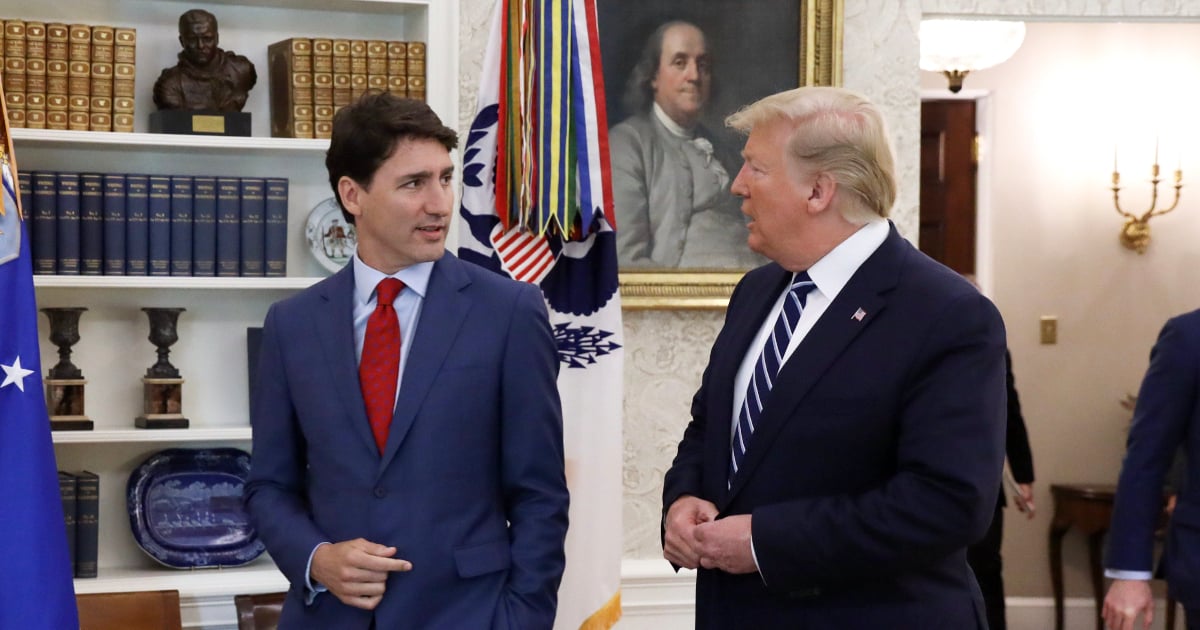
Related videos:
In a rise of trade tensions, Canada announced the imposition of a 25% tariff on U.S. products, in response to the decision by U.S. President Donald Trump to impose the same rate on Canadian imports.
The measure also includes a 10% tariff on oil and natural gas coming from the North American country.
Meanwhile, China warned that it will retaliate against Washington's new tariffs, amid a backdrop of increasing protectionism and global trade disputes.
Canada responds with equivalent tariffs
The Canadian Prime Minister, Justin Trudeau, described Trump's action as an "unjustified attack" and announced that his government will respond with proportional measures.
Starting next Tuesday, Canada will impose tariffs of 25% on U.S. products worth $30 billion. A second round of taxes, estimated at $125 billion, will take effect three weeks later.
"Canada will not tolerate an attack from a country that is supposed to be an ally and friend," Trudeau stated, noting that Trump's measure violates existing trade agreements, including treaties with Mexico.
Furthermore, according to El País, the Canadian leader urged his citizens to buy domestic products and expressed his support for the sectors affected by the U.S. decision.
In Ottawa, Trudeau was accompanied by the ministers of Foreign Affairs, Finance, and Public Safety, who agreed on the need for a strong response.
Subsequently, the president of the northern country held a virtual meeting with the governors of the provinces and had a telephone conversation with the president of Mexico, Claudia Sheinbaum.
The Canadian economy could be severely affected by Trump's tariff policy, as 76% of its exports are destined for the U.S. According to the Bank of Canada, the country's GDP could decrease by 2.4% in the first year of implementing these measures.
The price that the U.S. will pay for Trump's tariffs
In an article for The Atlantic, journalist David Frum explained that the tariffs imposed by Trump will affect not only Canada and Mexico but also the U.S. economy.
"Any tax on imports is also a tax on exports," Frum pointed out, explaining that products like American barley, which is primarily exported to Mexico for beer production, will be affected by the decline in demand.
The U.S. economy will also suffer due to the rising costs of key inputs, such as glass and aluminum, which will impact sectors like construction and aviation.
"America First" could be translated as "America Only," warned Frum, emphasizing that Trump's protectionist policies could isolate the U.S. from its trading partners.
In the past, countries that attempted to industrialize through high tariffs, such as Argentina and India, ended up marginalized from global markets. History suggests that trade barriers may cause more harm than good.
China promises reprisals in response to U.S. tariffs.
For its part, the Chinese Ministry of Commerce announced that it will take "corresponding countermeasures" to safeguard its interests following Trump's decision to impose a 10% tariff on Chinese imports.
In a statement issued on Sunday, Beijing indicated that it will also file a complaint with the World Trade Organization (WTO), accusing the U.S. of violating international trade rules.
Furthermore, he warned that these measures could impact cooperation between the two nations on issues such as fentanyl control and other illegal substances.
"China urges the U.S. to correct its erroneous practices and to engage in open dialogue to manage differences based on respect and mutual benefit," emphasized the official statement from the Asian giant.
Economists warn that tariffs could harm both China and the U.S., increasing costs for consumers and businesses. According to estimates from the Tax Foundation, cited by the agency EFE, these tariffs will result in an additional cost of $830 per year for U.S. households by 2025.
Global impact and future prospects
Trump's tariffs could also impact the global economy. According to the Peterson Institute for Economics, inflation in 2025 would increase by 2.27% in Mexico, 1.68% in Canada, 0.54% in the U.S., and 0.17% in China.
In terms of GDP, a decline of -0.22% is expected in Canada, -0.18% in Mexico, -0.16% in China, and -0.06% in the United States.
In a world where the U.S. needs allies to counter China's influence, Trump's trade policies could undermine the strategic relationships that have defined international trade since 1945.
"The United States is facing a new type of adversary," Frum concluded, warning that a protectionist policy could leave the U.S. isolated in an increasingly competitive global environment.
Filed under: